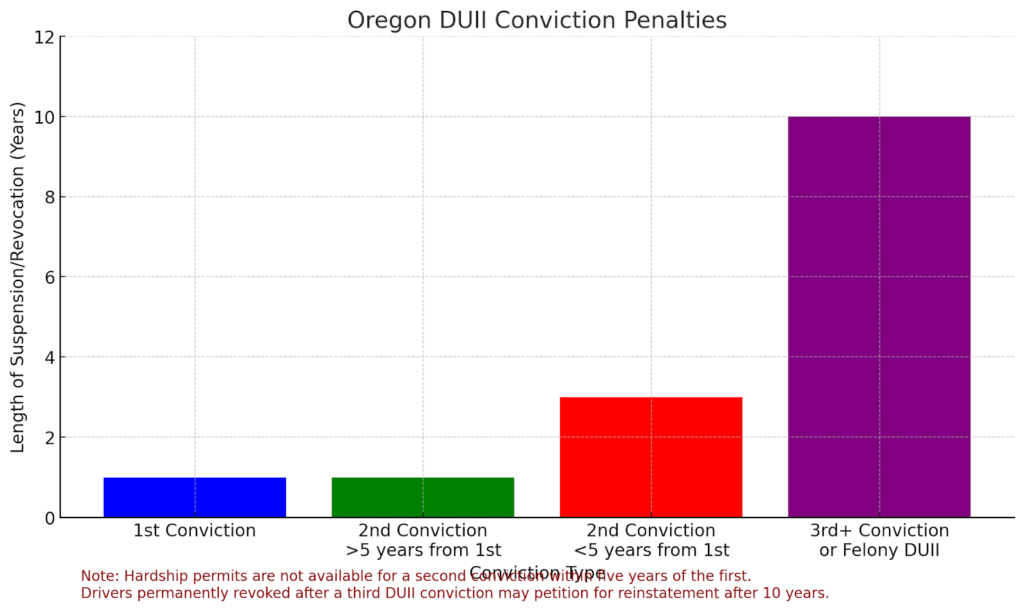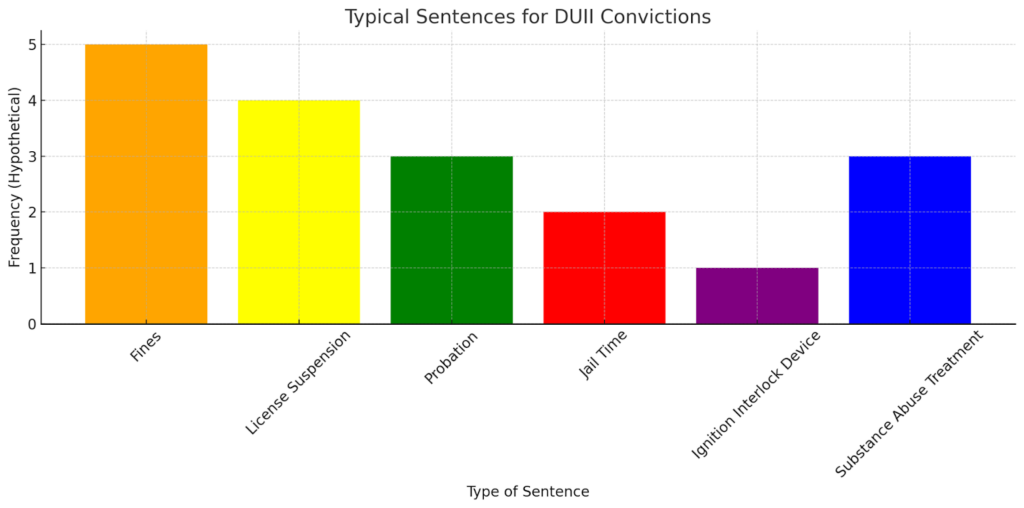What Is A DUII?
A DUII stands for “Driving Under the Influence of Intoxicants”. It is a term used in the state of Oregon, specifically, to describe the act of driving a vehicle while being adversely affected by factors like alcoholic beverages, drugs, or a combination of both. In Oregon, the legal term for drunk driving is DUII, whereas, in many other states, DUI or DWI are commonly used terms (Driving Under the Influence or Driving While Intoxicated).
The use of the term “intoxicants” in DUII reflects the broader range of substances, including both alcohol and drugs, that can impair a person’s ability to operate a vehicle safely. Oregon, like other jurisdictions, imposes legal penalties for individuals who are found to be driving under the influence of intoxicants, as it poses significant risks to both the impaired driver and other road users.
Let’s take a glimpse at some important data regarding DUII incidents in Oregon.

The Prevalence of DUI Incidents in Oregon
Oregon faces a significant challenge in combating driving under the influence (DUI). According to recent statistics, the state witnessed a concerning number of DUI-related incidents over the past years. In 2021 alone, there were more than 350 reported DUI arrests, highlighting the persistent nature of this issue.
Impact on Road Safety
DUI incidents have a devastating impact on road safety, posing risks not only to impaired drivers but also to innocent individuals who share the roads. Unfortunately, Oregon has experienced its fair share of alcohol-related accidents and fatalities. In 2021 year, the state recorded more than 2000 alcohol-related fatalities, underscoring the urgency to address this problem effectively.
Underlying Factors and Risk Groups
To better understand the DUI landscape in Oregon, it is crucial to examine the factors contributing to these incidents. Young drivers, particularly those aged 21-34, are more likely to be involved in DUI cases. Additionally, weekends, evenings, and holidays tend to witness a higher number of alcohol-related incidents. This knowledge allows law enforcement agencies and policymakers to focus on targeted strategies for prevention and education.
Legislative Measures and Enforcement Efforts
Oregon has implemented various legislative measures to tackle DUI. The state enforces strict blood alcohol concentration (BAC) limits, with drivers exceeding 0.08% facing penalties. Moreover, ignition interlock devices are required for repeat offenders or those with high BAC levels, helping to prevent repeat offenses. Law enforcement agencies have also ramped up efforts to increase DUI checkpoints and conduct targeted patrols to deter drunk driving.
Education and Prevention Initiatives
Alongside legal measures, Oregon emphasizes education and prevention campaigns to raise awareness about the dangers of drunk driving. Community organizations, government agencies, and non-profit groups work collaboratively to promote responsible alcohol consumption, provide educational resources, and offer alternatives to driving under the influence. These efforts aim to change attitudes and behaviors surrounding alcohol-related incidents.
How long do you lose your license for a DUII?
The length of a driver’s license suspension or revocation for a DUII (Driving Under the Influence of Intoxicants) conviction varies depending on the jurisdiction and specific circumstances of the offense. In the state of Oregon, where the term DUII is used, the Oregon Department of Motor Vehicles (DMV) administers the driver’s license suspension or revocation.
For a first-time DUII offense in Oregon, the driver’s license suspension period is typically one year. Nevertheless, it is crucial to consider that meeting the criteria for a hardship or restricted license may be possible after 30 days of the suspension period, allowing limited driving privileges for specific purposes like work, school, or medical appointments.
For subsequent DUII offenses within a certain time frame, the license suspension or revocation period can be longer. Second and third offenses carry longer suspension periods, potentially ranging from three years to a lifetime revocation, depending on the specific circumstances, prior convictions, and the time frame between offenses.
It is essential to keep in mind that the information provided serves as general guidelines for license suspension periods in Oregon, and specific cases can vary based on factors such as blood alcohol concentration (BAC) levels, the presence of aggravating circumstances, or any prior DUII convictions.

If you or someone you know is facing a DUII charge, it is imperative to seek guidance from a knowledgeable attorney or the local DMV to understand the specific laws, penalties, and potential license suspension or revocation periods that apply in your jurisdiction.
What are the typical sentences for being convicted of a DUII?
The sentences for a DUII (Driving Under the Influence of Intoxicants) conviction can vary depending on several factors, including the jurisdiction, the specific circumstances of the offense, any prior convictions, and the defendant’s cooperation with law enforcement. Please keep in mind that all this information should be duly acknowledged, provides a general overview, and that actual sentences may differ based on the individual case.
- Fines. DUII convictions often come with monetary fines, they can vary significantly, spanning from several hundred to several thousand dollars, contingent upon the jurisdiction in question and any aggravating factors involved;
- License Suspension. As mentioned earlier, a DUII conviction typically results in a driver’s license suspension or revocation. The duration of the suspension can vary based on jurisdiction, prior convictions, and other factors;
- Probation. Courts may impose probation as part of the sentence, requiring the individual to adhere to specific conditions, such as regular check-ins with a probation officer, attending alcohol or drug education programs, complying with random drug and alcohol testing requirements, and refraining from any further criminal behavior;
- Jail Time. Depending on the jurisdiction and the circumstances of the offense, a DUII conviction can lead to incarceration. The length of jail time varies widely, ranging from a few days to several months, particularly for repeat offenders or cases involving aggravating factors like high blood alcohol concentration (BAC) levels, accidents causing injury or death, or driving with a suspended license;
- Ignition Interlock Device. In many jurisdictions, DUII offenders, especially repeat offenders or those with high BAC levels, may be required to install an ignition interlock device (IID) in their vehicles. An IID measures the driver’s BAC before allowing the vehicle to start and may be a mandatory condition for reinstating driving privileges;
- Substance Abuse Treatment. Courts often order individuals convicted of DUII offenses to undergo mandatory alcohol or drug treatment programs, such as counseling or rehabilitation, as part of their sentence.
Seeking advice from a qualified attorney is of utmost importance to understand the specific laws, sentencing guidelines, and potential consequences that apply in your jurisdiction, as DUII sentencing can vary significantly depending on the circumstances and local laws.

Here is a graph depicting the typical sentences for DUII (Driving Under the Influence of Intoxicants) convictions
Summing Up
Oregon continues to grapple with the persistent issue of DUI incidents, posing threats to road safety and lives within the state. By analyzing Oregon’s DUI statistics, it is evident that further efforts and actions are required to address the matter effectively. Through a combination of strict legislation, robust enforcement, education campaigns, and community engagement, it is possible to make significant strides toward reducing DUI incidents and fostering a safer driving environment for all Oregonians. It’s crucial to commit to responsible choices and support initiatives that promote a culture of sober driving.